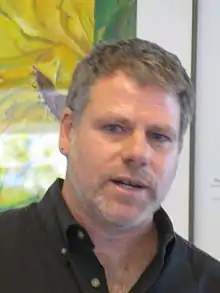Joshua Weiner
Joshua Weiner (born 1963 Boston) is an American poet.
Joshua Weiner | |
|---|---|
 | |
| Born | 1963 Boston, Massachusetts, U.S. |
| Occupation | Professor |
| Nationality | American |
| Alma mater | Northwestern University University of California, Berkeley |
| Genre | Poetry |
| Spouse | Sarah Blake |
Life
He graduated from Northwestern University, and earned his PhD in English and American Literature at the University of California, Berkeley. He served as the writing coordinator at the Fine Arts Work Center in Provincetown, and as a visiting assistant professor at Northwestern University.
He lives in Washington, D.C.,[1] with his wife, the novelist Sarah Blake, and two sons, and teaches literature and poetry workshops at University of Maryland, College Park, where he is Professor of English.[2] He is also the poetry editor of Tikkun magazine.[3]
His work has appeared in Best American Poetry, the Nation,[4] the American Scholar, New York Review of Books,[5] Chicago Tribune, Threepenny Review,[6] TriQuarterly, Chicago Review, Boston Review, B O D Y, Yale Review, Slate,[7] The New Republic,[8] and other journals.
Awards
Works
- "Found Letter", Poetry Foundation
- "Shame", Poetry, January 2006
- "The Dog State", Boston Review
- "WEEGEE: CONEY ISLAND BEACH AFTER MIDNIGHT; TRAMPOLINE; EPITAPH; ART PEPPER; POSTCARD TO THOM". Beltway Poetry Quarterly. 8 (3). Summer 2007.
- "The Bed". Threepenny Review. Fall 2004.
- The World's Room. University of Chicago Press. 2001. ISBN 978-0-226-88576-6.
- From the Book of Giants. University of Chicago Press. 15 April 2010. pp. 5–. ISBN 978-0-226-89051-7.
- The Figure of a Man Being Swallowed by a Fish. University of Chicago Press. 2013. ISBN 978-0-226-01701-3.
Joshua Weiner.
Essays
- "Canon Fodder: A highly personal list", Poetry Foundation
- History, memory, and poetics in Thomas McGrath's Letter to an imaginary friend. University of California, Berkeley. 1988.
- Mina Loy among the moderns. University of California, Berkeley. 1998.
Editor
- Joshua Weiner, ed. (2009). At the Barriers: On the Poetry of Thom Gunn. University of Chicago Press. ISBN 978-0-226-89043-2.
Review
I've always been impressed by Joshua Weiner's formal intelligence and his sure knowledge of how to make a poem. He's learned as much from Mina Loy, Robert Duncan, and Tom McGrath as he has from Thom Gunn, Thomas Hardy, and George Herbert. His poems are open to many different kinds of aesthetic approaches, including those of jazz and the blues. Like the modernists, he's embraced the past, but unlike some of them, he's alert to the formal possibilities lurking in popular culture. Among the squares, he is hip; among the hip, he is wary. So watch out. His poems are tonal land mines.[10]
References
- "Joshua Weiner".
- "English Department, University of Maryland - Joshua Weiner". Archived from the original on 2010-05-31. Retrieved 2009-07-19.
- "Joshua Weiner |". 21 May 2012.
- http://www.thenation.com/archive/search.mhtml?query1=joshua%20weiner%20
- "Joshua Weiner".
- "Current Issue of the Threepenny Review".
- "Joshua Weiner".
- Weiner, Joshua (3 February 2013). "Hikmet: Çankiri Prison, 1938". The New Republic.
- http://www.amylowell.org/Amy%20Lowell%20Scholarship%20winner%20letter.pdf
- Tom Sleigh (Winter 2000–2001). "Emerging Poet: On Joshua Weiner". American Poet.